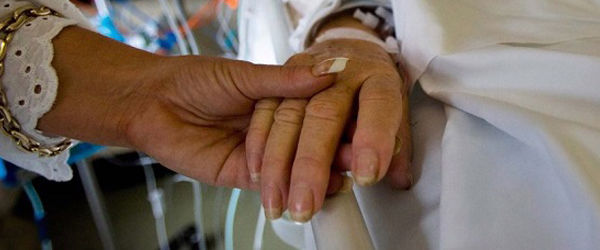In Celebration of National Pastoral Care Week, more than 35 chaplains of the archdiocese attended an Education Day October 17 hosted by St. Francis Medical Center in Lynwood.The purpose of the gathering was to develop a closer rapport and cooperation among local chaplains, said Friars of the Sick Poor Brother Richard Hirbe, director of Spiritual Care and Ethics at St. Francis.“This collaborative event,” said Brother Hirbe, “is intended to provide the chaplains of the archdiocese with opportunities for networking, furthering their education and support as they provide both professional and compassionate spiritual care to the whole person.”He noted this has been the hallmark of the Daughters of Charity (sponsor of St. Francis Medical Center) since their founding in 1633. “These chaplains seek to meet the needs of the whole patient — in mind, body and spirit — as did St. Vincent de Paul,” he added.The conference’s featured speaker was Sulpician Father Gerald Coleman, director of Health and Health Care Services for the Archdiocese of San Francisco and a lecturer in Moral Theology at Santa Clara University, as well as vice president of Corporate Ethics for the Daughters of Charity Health System.In his talk, “Forming the Conscience of a Chaplain,” Father Coleman emphasized the necessity of listening to one’s heart. “Listening to the voice of God as that voice speaks to you” is the conscience working, he said. “Conscience is a person’s secret core, and everyone is called to form that conscience.”Every faith community has conscience issues, he added. “The central view in conscience formation is that of prudence,” he said. “You never act unless you are prudent.”Father Coleman referred to ethical and religious directives that bind Catholic hospitals to service, and the importance of harmony with the Church. He took the group through the levels of conscience formation and drew relationships to issues that affect healthcare today — embryonic stem cell research, destruction of human embryos and acts “hostile to human dignity,” such as trafficking of women and children, sexual abuse and even “just war.”“We need to be pro-life on all of these issues; it is a seamless argument,” he asserted. After Father Coleman’s presentation, chaplains spent time in discussion regarding future gatherings and agreed to meet on a yearly basis. Brother Hirbe said the group hoped “to bring greater awareness of our ministry as chaplains to our institutions, to the patients we serve and the archdiocese as a whole.”The role of Catholic hospitals in the archdiocese --- serving Catholics and non-Catholics alike --- makes the role of chaplains equally significant, said Religious Sister of Charity Angela Hallahan, archdiocesan director of Health Affairs.“At St. Francis Medical Center and its clinics alone,” she noted, “the number of adults who receive services is something like 700,000 adults and 300,000 children; that is staggering. When else are we more like Jesus than in dealing with the sick and infirm? My hope is that our chaplains continue this type of networking and sharing as often as possible. Their work is wonderful.”Nonetheless, she added, “we need more chaplains especially in underserved areas of Los Angeles. With 14 Catholic hospitals in the archdiocese and nine Catholic residential healthcare facilities for retirement/skill care, and at hospitals such as L.A. County/USC — which has close to ten Catholic chaplains — the need is just overwhelming. These wonderful and generous chaplains and their assistants make such an impact on Los Angeles.”
{gallery width=100 height=100}gallery/2011/1111/chaplains/{/gallery}

